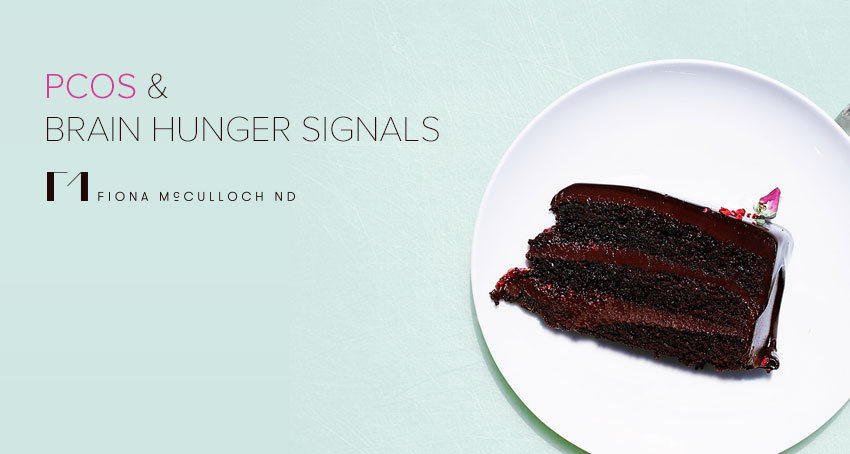If you have PCOS, you may feel that you have an altered relationship with food and with feelings of hunger. Before I made major changes to the way that I eat, portion control was always a challenge – it was often difficult for me to stop eating high calorie foods. It’s something I’ve struggled with and over time have learned to create a more balanced relationship with feelings of hunger. I did this primarily through increasing my consumption of nutrient dense, lower glycemic index foods. Interestingly, there is a hormonal and brain-related reason for increased hunger and binging on unhealthy foods in women with PCOS.
In 2014, the first study ever to determine the effects of insulin resistance in PCOS on the brain reactivity to food was conducted. These 19 women ranged from having normal insulin responses, to having significant insulin resistance. Insulin resistance is one of the central aggravating features of PCOS, and can affect fertility, hormone regulation and create high androgen levels – now interestingly, we see its effects on our brains themselves.
The women in the study underwent a glucose tolerance test, while having MRI imaging of their brains. During the MRI, women viewed pictures of high calorie foods such as hamburgers, french fries, pizza, ice cream and cake, and low calorie foods such as fresh vegetables, fruits and salads.
Increased area of responses in the brains of women with insulin resistant PCOS, when viewing a picture of high calorie food. Ref: Dean A. Van Vugt, Alicja Krzemien, Hanin Alsaadi, Tamar C. Frank, Robert L. Reid, Glucose-induced inhibition of the appetitive brain response to visual food cues in polycystic ovary syndrome patients, Brain Research, Volume 1558, 16 April 2014, Pages 44-56.
What the researchers found, was startling. Insulin resistant women with PCOS have the opposite brain hunger reactions to high calorie food that those without insulin resistance have.
The glucose tolerance test comprised of drinking sweet beverage with a high amount of sugar followed by testing of glucose levels after the test. The brains of the women who had normal sensitivity to insulin showed a reduced brain reactivity to the pictures of high calorie food after this sugary drink, something that would be normally expected.
However, the women who were insulin resistant actually had increased reactivity in multiple “hunger” stimulating areas of the brain when shown high calorie food pictures after consuming the sugary drink.
As such, in women who are insulin resistant, the brain actually becomes hyperactive in the areas related to desiring food, after having a carbohydrate heavy meal. This, as you can imagine is what can start a person off on a carbohydrate binge, probably one of the worst dietary aggravators to a woman with PCOS.
Normally when we eat, our insulin increases to help our body remove the glucose from the bloodstream and store it as energy. This increase in insulin should inhibit the centers in the brain that cause us to want to eat more food.
The researchers concluded that the insulin-induced inhibition of brain reactivity to food cues is compromised in insulin resistant women with PCOS. Eating a load of carbohydrates when you are insulin resistant, makes you want to eat more high calorie foods immediately.
As such, when you break the cycle of insulin resistance through low glycemic load nutrition, exercise and the right supplements, you can break this cycle of excessive hunger and over-eating. Every step you take towards reversing insulin resistance makes it easier to keep moving forward towards your goals.
I certainly found that this study rung true for me – eating sugar very simply makes me want to eat more – and it’s all because of how the brain responds!
Lorem ipsum dolor sit amet, consectetur adipiscing elit. Ut elit tellus, luctus nec ullamcorper mattis, pulvinar dapibus leo.
Did this article ring true for you, or explain anything about your hunger for specific types of foods?
Article References:
- Dean A. Van Vugt, Alicja Krzemien, Hanin Alsaadi, Tamar C. Frank, Robert L. ReidGlucose-induced inhibition of the appetitive brain response to visual food cues in polycystic ovary syndrome patientsBrain Research16 April 2014;1558:Pages 44-56.

